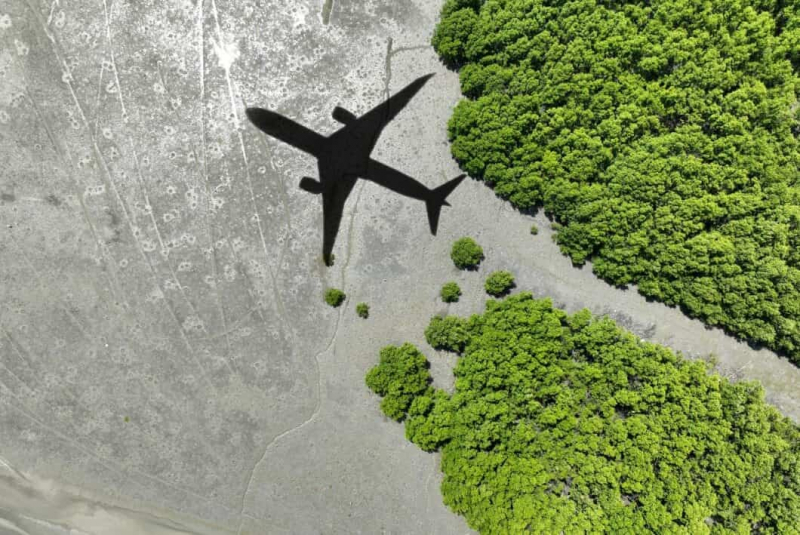Picture this: You’re enjoying a kopi at Changi, ready for your flight, and you notice a new charge – a “Green Fuel Levy” of S$10.40. To the eco-minded, it might seem a reasonable expense for a healthier planet. But for backpackers heading to Bali on a budget, it might feel like a sting. Singapore, a major player in Southeast Asian aviation, is making a move by adding a “green fuel tax” to plane tickets, with the revenue going towards greener aviation.
The Civil Aviation Authority of Singapore (CAAS) says the levy will apply to plane tickets bought from April 1, 2025, for flights taking off after October 1, 2025. The cost, ranging from about S$1 (US$0.77) to S$41.60 (US$31.95), depends on the flight’s distance and the class you’re flying in – economy pays less, while business and first-class cough up more, sometimes four times as much. Short flights around Southeast Asia? Just S$1 for economy seats. Long journeys, like to the Americas? S$10.40, rising to S$41.60 for premium seats. If you’re just passing through Changi, no tax for you. Cargo flights will also have a surcharge per kilogram, so everyone contributes.
Pioneering the Path to Sustainable Skies
What makes Singapore’s move special? It’s not just another airport fee; it’s a tax that’s explicitly linked to sustainable aviation fuel (SAF). SAFs are eco-friendly fuel blends made from waste oils, agricultural leftovers, or even captured CO2, but they’re pricier. So far, no other country has done this, making Singapore a leader in green aviation. Changi Airport, famous for its orchids and butterflies, is on track to beat its 2019 record of 68.3 million passengers this year, making this initiative all the more important.
Interestingly, SAF prices have recently fallen, meaning CAAS could reduce the levy from its initial S$3 to S$16 range. As a CAAS representative pointed out, this change shows their dedication to keeping travel affordable while pushing for decarbonization. The levy, they said, is central to Singapore’s broader environmental plans.
Fueling the Future
Every cent from the levy will be used to buy SAF in bulk, reducing aviation’s carbon footprint one flight at a time. Singapore aims to have SAF make up 3-5% of jet fuel use by 2030, quite a jump from today’s almost zero. This is a big challenge, given the industry uses 300 billion liters of conventional kerosene each year globally. While aviation currently accounts for just 1.2% of global greenhouse gases, this percentage could increase as passenger numbers are expected to double by 2050.
Click here to preview your posts with PRO themes ››
The International Air Transport Association (IATA) has reported that SAF production doubled last year. However, it still only accounts for about 0.3% of all jet fuel used. This situation clearly shows how difficult it is to obtain SAF at scale. The high costs (SAF can be 2-4 times more expensive than fossil fuels) and scaling issues make this transition “challenging but necessary”, according to an analyst. Singapore’s levy could inspire other regions, like the EU (which has its own SAF targets), to take similar steps.

Mixed Reactions
The announcement has been met with both approval and worry. Environmentalists are calling it a “bold, necessary step,” and groups such as the World Wildlife Fund are happy to see a direct link between passenger fares and emissions reductions. Airlines, including Singapore Airlines and Scoot, seem to be supportive, viewing centralized SAF purchasing as a way to stabilize volatile SAF markets.
Not everyone’s happy, though. Some industry observers are warning that the green fuel tax could hurt competitiveness, particularly for budget airlines flying to India and Indonesia. The Asian Travel and Tourism Association worries that the levy may “price out leisure travelers” at a time when Asia’s aviation sector is still recovering. Social media discussions reflect this divide: hashtags like #GreenTaxSG are trending, with both humorous “eco-farewells” and serious commitments to offset flights. Initial research points to limited deterrent effect—the majority of air travelers express a willingness to contribute for the benefit of environmental initiatives—although budget-conscious flyers voice concerns regarding the accumulation of fees on top of already escalating fuel expenses.
Clearing the Air: A Blueprint for the World?
With Changi Airport witnessing unprecedented levels of air traffic, Singapore’s approach hinges on widespread public acceptance: a small fee added to each ticket to fund environmental sustainability efforts. Should it prove effective, it could serve as a model for worldwide environmental responsibility, prompting hesitant governments from Tokyo to Toronto to take action. Detractors, however, argue that genuine change necessitates groundbreaking technologies, not merely incremental surcharges—for instance, electric vertical takeoff and landing vehicles or hydrogen-powered aircraft in the future.
Currently, the skies above the equator are incrementally greener, achieved through a step-by-step levy system. For travelers, take note: Your upcoming stopover in Singapore might indirectly contribute to the preservation of mangrove ecosystems. Or, at the very least, lessen the feelings of guilt associated with indulging in premium alcoholic beverages during flights.


